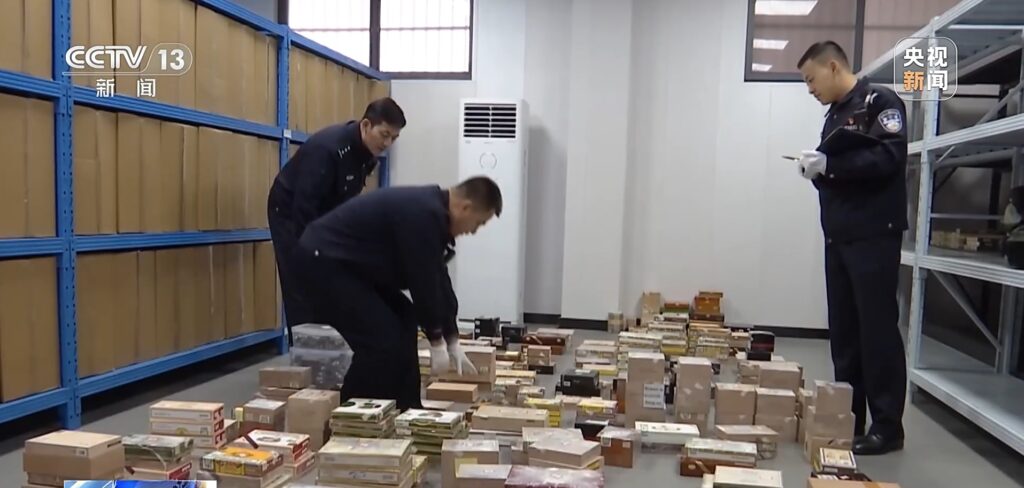
In China, The Hunt For Smuggling Is Open
Since the start of the year, Chinese customs have dismantled at least four contraband cigar resale networks. For a few millions of euros value.
Régis Besko
For most aficionados, China is a blamed country. Notably because it is supposed to siphon off an already bloodless Cuban cigar market and would therefore increase the scarcity of vitolas. And the image of the Chinese tourist flying back home with suitcases overflowing with boxes of Cuban cigars has become a stereotype for most of European enthusiasts.
There is some truth in all this. Last May, customs officers at Beijing airport intercepted a traveler who had, in his suitcase, 60 boxes of cigars containing 1,113 vitolas . Airport authorities did not specify whether the suspect was trafficking for his own account or for a network.
Cigars purchased on the Internet and resold via specialized forums
The stated priority of Chinese customs officers is the dismantling of distribution networks active within the country and which often operate in the same way: traffickers order, directly or via intermediaries, cigars on a road online websites. They receive them in China via post or carriers. And do false declarations of values and contents and multiplying the recipients. Once they arrive on Chinese territory, the cigars are most often sold secretly via discussion forums on the Internet. At prices increased by 5 to 10% minimum.
Seizure of illicit cigars by Beijing customs. © DR
The business is lucrative. And although there are no centralized statistics allowing us to get a precise idea what the traffic is, a careful reading of Chinese media and social networks shows that every customs highlight some seizures of illicit cigars or the dismantling of a trafficking network. Which Chinese administration publicizes by emphasizing the amounts of fraud and the shortfall in terms of taxes.
Several networks dismantled in a few months
Since the start of the year, several cases have been highlighted by Chinese customs officials. The latest case happened in May in the city of Shenyang, the capital of Liaoning province (north-east). More than 7,000 illicit cigars were seized, mainly Cohibas and other premium brands from Habanos SA. All for a market value estimated at more than 20 million yuan (a little over 2 million euros). The shortfall for the tax administration, due to the non-declaration of these cigars, would reach 10 million yuan.
According to local press, the cigars had been purchased in a European country and the packages were intercepted by customs officers during routine inspections. The investigation uncovered an organized Cuban cigar smuggling network led by a man who admitted to having started buying cigars abroad in December 2019 in order to resell them. To obtain the precious vitolas, he ensured that they were sent to him in separate packages using the addresses of certain members of his family or friends.
More than 7,000 cigars were seized by Shenyang customs. © DR
A few weeks earlier, another operation was revealed by customs in Nanjing (east). This time, 18 people were arrested and 15,000 cigars were seized. Estimated value of the loot: more than 12 million yuan. Here again, the modus operandi was the same: false declarations of the contents and values of packages coming from abroad. One of the arrested suspects began his illicit activity in 2017. Another had a walk -in humidor built in his home where more than 9,000 cigars were found at the time of his arrest.
Although, unsurprisingly, most of the cigars seized were Cuban, brands from the New World were also present. The images released by customs show in particular boxes of VegaFina or Oliva but also Ashton or Illusione. In total, boxes of around twenty different brands of cigars were found.
Operation “green sword” in Beijing
Beijing, the Chinese capital, is not immune to the scourge. To the point that the Metropolitan Customs services, in collaboration with the local branch of the tobacco monopoly office, launched a special operation last April which is due to end in March 2025. Called “Green Sword”, it would have, during the first month of investigation, made possible to dismantle two networks which were rampant in the metropolis and led to the arrest of four people. No less than 27,000 contraband Cuban cigars were seized. The traffickers also sold cigarettes. Total value of these seizures, including cigars and cigarettes: 1.2 million euros and a tax loss of more than 500,000 euros.
In addition to dismantling existing networks, officials in the capital promise to attack supply circuits and, to this end, to enlist the collaboration of the services of the airport authorities and those of the post office.
However, we still remain far from the scale of the affair which marked the month of June 2023. At the time, and at the end of an investigation which lasted almost a year, the customs officers and police officers of Lanzhu, a city located 1,500 km southeast of Beijing, arrested 24 suspects. They put an end to an illegal sales network which was established in around ten Chinese provinces (the country has 23 plus five autonomous regions) and had been operating since 2021. More than 15,000 contraband cigars were then seized. The total amount of funds involved was 120 million yuan, or just over 15 million euros.
You might also like

Habanos S.A. features a Partagás for the Year of the Snake

L’Amateur de Cigare English edition #22 is online

Belgium bans public display of all tobacco products from April 1, 2025

Tobacco is Cuba’s “main export product”, according to president Miguel Díaz-Canel

Phoenicia’s Diplomaticos Genios introduced in Havana
Current Issue
ADC Eng 22
All the latest cigar news




